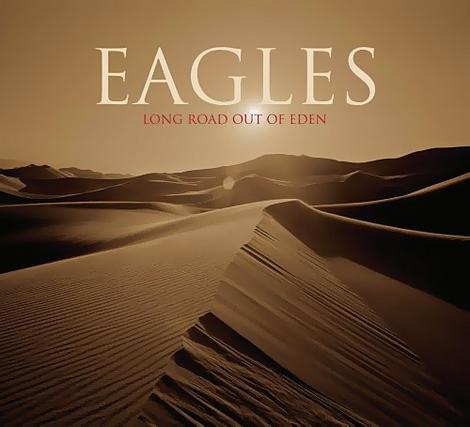
Long Road Out of Eden (2007)

Disc One
1. No More Walks in the Wood
2. How Long
3. Busy Being Fabulous
4. What Do I Do With My Heart
5. Guilty of the Crime
6. I Don't Want to Hear Any More
7. Waiting in the Weeds
8. No More Cloudy Days
9. Fast Company
10.Do Something
11.You Are Not Alone
Disc Two
1. Long Road Out of Eden
2. I Dreamed There Was No War
3. Somebody
4. Frail Grasp on the Big Picture
5. Last Good Time in Town
6. I Love To Watch a Woman Dance
7. Business as Usual
8. Center of the Universe
9. It's Your World Now
Given the band’s rather barbed history and penchant for boardroom drama, few expected Long Road Out of Eden to be anything more than a finely wrapped afterthought — a legacy box ticked, a late-career gesture towards relevance. And indeed, there were ample reasons to be suspicious. No new studio album in nearly three decades. The unceremonious sacking of Don Felder, who’d been replaced by Steuart Smith — a gifted but non-voting member. The eyebrow-raising exclusive deal with Wal-Mart — especially ironic considering Don Henley’s well-documented distaste for big-box retailers and his eulogies for the lost era of the neighborhood record store.
And yet, against all odds, Long Road Out of Eden turned out to be not only a worthy return, but perhaps the band’s most musically cohesive and thematically ambitious work to date. It’s sprawling — twenty tracks across two discs — but astonishingly consistent in tone and delivery. It feels less like a reunion and more like a band picking up the thread of an idea they left dangling sometime around 1976.
Structurally, the album finds its balance in an elegant collision of past and present. Sonically, it echoes Hotel California, but thematically it extends well beyond, with Henley and Frey assuming near-total vocal and authorial control. Schmidt and Walsh offer their expected moments — tastefully measured, perhaps even subdued — but the narrative arc belongs unmistakably to the band’s co-captains. Walsh in particular has toned down the goofball antics, opting instead for a mellow introspection that suits the album’s tone. He’s no longer the wildcard; he’s the cool, steadying hand.
The album opens on uncertain footing with No More Walks in the Wood, a brief a cappella environmental lament that feels more like a PSA than a prelude. It’s earnest, and it’s short — which helps. From there, however, the record rights itself with How Long, a Frey/Henley duet with bright harmonies and a distinctly ‘70s country-rock shuffle. It’s a fitting callback to Take It Easy, and it reintroduces the band on familiar, comforting terms.
What follows is, to put it plainly, surprisingly strong. Tracks like Busy Being Fabulous, What Do I Do with My Heart, and Waiting in the Weeds offer lush melodies and strong lyricism — the sort of mid-tempo storytelling that has always been the band’s hallmark. Schmidt’s I Don’t Want to Hear Any More is another soft standout, if less memorable than his previous Love Will Keep Us Alive. Walsh contributes Last Good Time in Town, a wry, self-aware groove that proves he’s still very much part of the fabric.
Disc Two is where Henley, for better or worse, takes the reins. Frail Grasp on the Big Picture and Business as Usual are lyrically dense — pointed social critiques in which the message slightly overpowers the music. These songs carry weight, but occasionally forget they’re on a rock album. Henley has always been the band’s conscience, but here, he risks becoming its lecture hall.
That said, the title track — an epic, ten-minute slow burner — anchors the second half with elegance and bite. It’s sprawling without being bloated, political without being preachy, and musically rich enough to carry its length. Elsewhere, Center of the Universe and It’s Your World Now provide soft landings, if not standout finales.
Curiously, three songs clock in at over seven minutes, yet none feel like self-conscious epics. They meander, gently, but with purpose. It’s rare for a double album to remain engaging throughout — rarer still for it to feel like a necessary statement rather than an indulgence. But Long Road Out of Eden does just that.
Of course, it’s not without its flaws. There’s a certain uniformity to the mid-tempo arrangements, and Henley’s worldview can sometimes come across more like a sermon than a conversation. But the surprise here is not that the Eagles managed to make a new record. It’s that they made one this good. At a time when most legacy acts are content to retread the past, the Eagles delivered a proper album — expansive, thoughtful, and utterly their own.
Let’s just hope they don’t wait another thirty years.
Go back to the main page